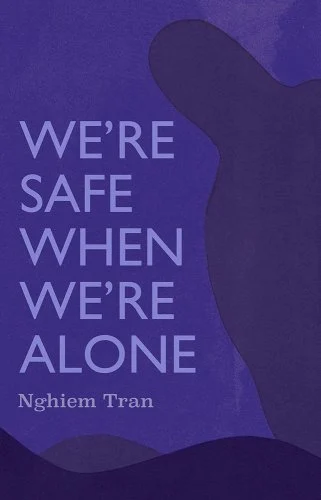I enjoy fiction that has a vaguely menacing atmosphere. Narratives with the threat of death looming over the characters, and they either are not able to identify the source or they do but face enormous difficulty reconciling their fears. This threat can manifest as ghostly projections of the characters’ unstable mental state. They might see or hear something that isn’t really there and then experience intense loneliness or paranoia due to their limited perspective.
I can’t say for sure that I believe in ghosts, but I do believe feelings of loneliness and despair can be so powerful that the mind, in an attempt to force them out of the body, creates forms or containers for them in our environment. In my debut novella, We’re Safe When We’re Alone, I wanted a narrator who fully believes in ghosts and their power to destabilize the mind. The narrator and his father are the only humans in a purgatory world populated by ghosts, and he fights to hold onto his sanity as the rules of his surreal environment constantly shift to make him doubt his identity.
I’ve found that the novella form is especially suitable for evoking a ghostly atmosphere. It is long enough for the reader to experience several facets of the characters’ psychology, but it is short enough that the unique atmosphere can be maintained throughout the entire narrative. Novellas tend to be taut in structure, with almost no scenes that diverge from the central plot-line. This intense focus over a longish period excels at immersing the reader in a strange world and then bringing them out before the atmosphere loses its magic. In my search for books with this type of atmosphere, I found mainly novellas by women in translation. In these books, grief, violence, death, and loneliness transform realistic settings from all around the world into dreamlike, haunting landscapes.
The Hole by Hiroko Oyamada, translated by David Boyd
After Asa’s husband transfers to a job in the countryside, they move into his family home, and Asa tries to adjust to her new rural life. She is no longer working and has no friends in the area. Other than interacting with her in-laws, she has almost nothing to do and struggles to fill the time during an overwhelmingly hot summer.
As she becomes lost and depressed in this alien environment, she encounters a strange dark creature, follows it to a river, and then falls into a hole. After she manages to get out of the hole, she experiences more bizarre incidents that cause her to question if the things she sees and feels are real. The isolation she experiences in her new home leads her to interact with one of the most chilling characters I’ve ever read, an old man who loves to water his plants, even in the dark. A moment that is completely ordinary and yet I’m unable to fully understand why I am so haunted by it.
Love by Hanne Ørstavik, Translated by Martin Aitken
Vibeke, a single mother, and Jon, her son, have moved to a small town in northern Norway. The novella takes place over a single night as Vibeke goes off on her own to pursue a love interest and Jon wanders around his neighborhood and meets unusual strangers who might possibly put him in danger.
The novella is told in third person, but the point of view switches between Vibeke and Jon’s consciousness from paragraph to paragraph. The effect can be disorienting at first, but once the reader is used to the shifts, the point of view highlights how neglectful Vibeke is since she rarely thinks about Jon while Jon is constantly thinking of her. As the night drags on, the cold and the dark heighten the atmosphere of peril, and the characters struggle against the loneliness that presses in on them.
Fever Dream by Samanta Schweblin, Translated by Megan McDowell
The novella is structured as a dialogue between Amanda who lies dying in a rural hospital clinic and a boy named David. He asks her questions about the events that occurred in the past few days while she was on vacation with her daughter. He pushes her to figure out the important details that she missed, and his urgency forces the reader to turn the pages to see if we can spot these key details that led to Amanda’s demise, thus building an atmosphere of dread.
The main narrative takes place once Amanda meets her neighbor, Carla, at the vacation home, and she tells Amanda a menacing story about how she saved her son, David, from an unknown illness. Carla’s story prompts Amanda to fixate on keeping her daughter safe, but as the days pass she is forced to confront her own failures as a mother.
Minor Detail by Adania Shibli, Translated by Elisabeth Jaquette
The first half of the book takes place during the summer of 1949 and focuses on Israeli soldiers who set up camp in the Negev desert. After the war that led to the displacement and exile of the Palestinian people, these soldiers are here to murder any Bedouins who are still in the area. They find an encampment and capture a Palestinian girl. The second half fast forwards to the present and focuses on a young woman who reads an article about these murders in the Negev desert and sets off on a road trip to uncover more details around the tragedy.
The soldiers’ indifference to the suffering of the girl, along with the overwhelming heat and the bodily illnesses that the officer suffers, build up so much vivid tension that ends up spreading into the present day and haunting the reader as we follow the young woman, desperately hoping that she’ll find some answers to make the injustices of the past less devastating to behold. But of course the book offers no easy answers. Instead, the author leaves the reader with images of the humanity of victims who have been erased from public records.
Space Invaders by Nona Fernández, Translated by Natasha Wimmer
A group of childhood friends grow up under the Pinochet dictatorship in 1980s Chile. One day a new classmate, Estrella González arrives at their school, and they quickly grow fond of her and bring her into the group. However, her father is a government officer in the regime and ends up committing violent crimes against members of the opposition. Afterward, Estrella withdraws from school and disappears with her family from her friends’ lives.
As the children turn into adults, they are haunted by dreams and questions about Estrella’s fate. The constant threat of violence from the dictatorship pervades the atmosphere, but what makes this book remarkable is the friends’ insistence on remembering the innocence of their childhood bonds. No matter how much their environment tries to crush their humanity, they speak in a lucid, dreamlike language that strengthens their devotion to one another.
The White Book by Han Kang, Translated by Deborah Smith
A Korean writer arrives in a European city for a residency and reflects on the loss of her older sister, who died right after being born. This city was nearly destroyed in World War I but recovered from the ruins. As the narrator wanders this landscape, she sees the snow and the gray sky and feels haunted by the past. A historical and personal one.
The book is broken into short chapters titled after white objects. The objects relate to the loss of her older sister or to her current surroundings. The author describes them with clear poetic language that illuminates the character’s sorrow. By the end of the book, the color white haunts the reader the way it does the narrator, and we’re left feeling that grief can be as beautiful as it is devastating.
Sweet Days of Discipline by Fleur Jaeggy, Translated by Tim Parks
The narrator recalls her experiences in a boarding school located in postwar Switzerland, specifically her obsessive relationship with a new student, Frédérique. The narrator’s voice is harsh, forceful, lyrical, and magnetic. Most notably she describes the relationship as one in which she “had to conquer [Frédérique],” and she feels the close presence of death in the environment, stating “There is a mortuary look somehow to the faces of boarders, a faint mortuary smell to even the youngest and most attractive girls.” The narrator’s fixation on death darkens the spirit of her relationships and strips away the innocence of girlhood at this boarding school, revealing the cold, desolate systems of control at the center.
Kitchen by Banana Yoshimoto, Translated by Megan Backus
After Mikage’s grandmother dies, she is taken in by her friend Yuichi and his mother Eriko. The three of them grow close and form a makeshift family. Eventually Mikage moves out and tries to create a life of her own. However, she learns about a horrific tragedy that befalls Eriko, and she returns to support Yuichi through this difficult period. Unfortunately, they are not able to connect as easily as they did in the past, and Yuichi plunges into the abyss of grief. Yuichi’s deteriorating mental state charges the atmosphere with dread, and I feared not only for his well-being but also for Mikage as she searches for him and attempts to bring him out of the darkness. The beauty of the novella lies in the compassion the characters show to each other even as the presence of death hovers directly over them.

